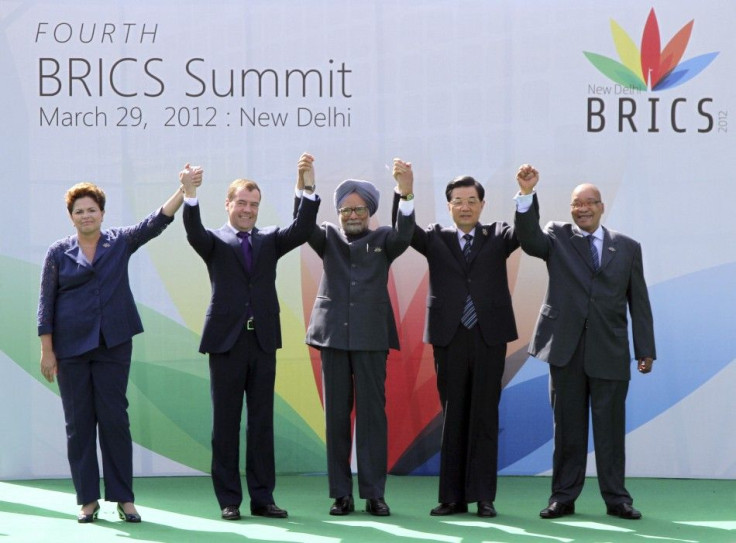BRICS Nations Talk Tough To West, Start Rival Development Bank

The leaders of Brazil, Russia, India, China and South Africa, meeting in New Delhi on Thursday, drafted a joint statement lambasting the West's aggressive monetary policies and dominance of global institutions.
Collectively known as the BRICS, the heads of the world's five largest emerging economies also took steps at the fourth annual summit toward greater unity and launched a proposal to create a financial institution that could eventually rival the World Bank. At the one-day summit, leaders also signed two agreements to enhance trade ties.
In a joint statement, the BRICS also labelled bank loans, bond buying and quantitative easing measures by America and Europe in the wake of the global financial crisis aggressive policy actions that have flooded the developing world with excess liquidity.
In a further criticism of the West's dominance of global institutions, Indian Prime Minister Manmohan Singh called on the BRICS nations to unite over reform of the United Nations Security Council.
While some progress has been made in international financial institutions, there is lack of movement on the political side, Singh said at the summit. BRICS should speak with one voice on important issues such as the reform of the UN Security Council.
The leaders also reiterated demands on the International Monetary Fund and World Bank to implement promised voting and quota reforms by January 2013.
A New Bank
While the group is united in its for greater representation on a global level, individual members are often divided when it comes to addressing multilateral issues, and frequently clash at international bodies such as the UN.
But in what could be the start of a more cohesive organization, on Thursday the group took steps to create its first institution in the form of a BRICS-led development bank.
Underscoring the five countries' commitment to break away from the U.S.-dominated system of international financial institutions that emerged from World War II, the proposed South-South Development Bank would mobilize resources for infrastructure and sustainable development projects in BRICS and other emerging economies and developing countries, according to the summit statement.
The group has directed finance ministers from each member state to form a committee assessing the feasibility of the bank and report back at next year's summit.
The 'Monetary Tsunami'
Aside from calls for greater political clout, the main thrust of the group's criticism was directed at Western monetary policies adopted in the wake of the global financial crisis.
Excessive liquidity from the aggressive policy actions taken by central banks to stabilize their domestic economies has been spilling over into emerging market economies, fostering excessive volatility in capital flows and commodity prices, the joint statement read.
We believe that it is critical for advanced economies to adopt responsible macroeconomic and financial policies, avoid creating excessive global liquidity and undertake structural reforms to lift growth that create jobs.
On Thursday, Brazilian President Dilma Rousseff also criticized the West for pursuing unjust fiscal policies, unleashing what she called a monetary tsunami on the developing world.
The joint statement followed earlier comments by Brazilian Trade and Industry Minister Fernando Pimentel, who told Reuters the West was to blame for releasing a wave of global liquidity that has flooded developing countries such as Brazil, driving up currencies and creating volatility in commodity prices.
In contrast, both the U.S. and Europe have maintained that China artificially manipulates its yuan currency to the detriment of other nations. Brazil's Pimentel, however, said in an interview on the eve of the New Delhi summit that China isn't to blame. It has to do with the dollar and the euro, he asserted, adding, all the delegates have more or less the same vision on this matter.
© Copyright IBTimes 2024. All rights reserved.





















